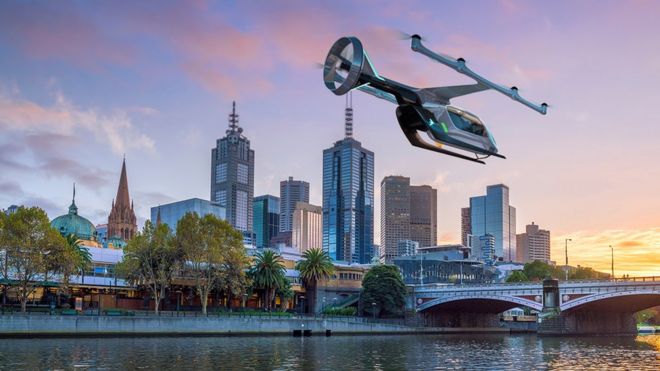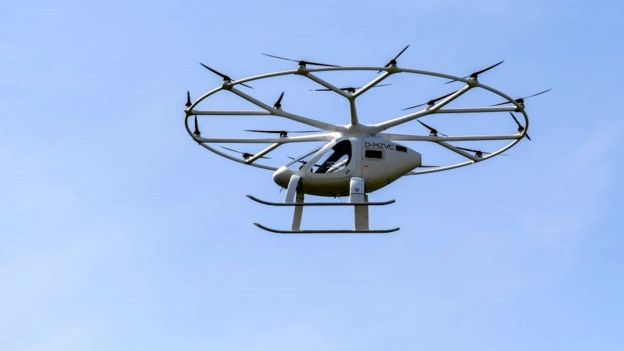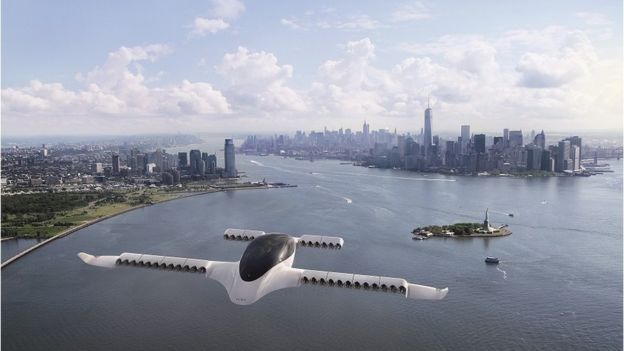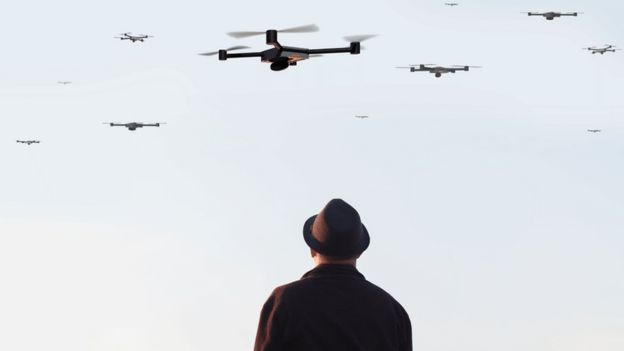The airborne commute - a flight of fancy?
 UBER
UBER
There is something about the idea of a flying car that sparks the imagination - maybe it is the association with futuristic sci-fi movies or just the idea of finally finding a way to beat the traffic that appeals.
And there are hundreds of firms competing to come up with the perfect airborne vehicle, with around 175 new designs currently vying to get made.
But can a sky-high commute ever be achieved and, if it can, will it be affordable for the average harassed commuter?
The BBC met two German firms working to make electric vertical take-off and landing (eVTOL) aircraft a reality, at a recent tech summit in Lisbon.
 GETTY IMAGES
GETTY IMAGES
Volocopter and Lilium are friendly rivals in the flying taxi space and their crafts look very different. Lilium's is a slick white machine more like a plane, while Volocopter's futuristic design combines the looks of a drone and a helicopter.
Lilium's electric-powered vehicle is capable of flying for one hour on a single charge, but the challenges for the firm are moving from a two-seater model to one that can carry more passengers and to switch from vertical to horizontal flight.
Volocopter is planning shorter journeys from bespoke Voloports and by 2035 aims to have dozens of these across Singapore, able to handle 10,000 passengers a day. Eventually it wants its craft to be able to land anywhere.
In October, Volocopter flew its taxi across Singapore's Marina Bay - a short journey, nearly abandoned because of a heavy downpour.
Test flights are incredibly important if firms like Lilium and Volocopter want to gain regulatory favour, but they are a long way from a regular commute. However, both firms claim that once their machines take off, they will be affordable for the masses.
"If the journey is short then the cost will be similar to that of a normal taxi, and if it is a longer trip it will be equivalent to a high-speed rail ticket or an economy flight," said Lilium founder Daniel Wiegand.
Volocopter's founder Alexander Zosel agrees, saying his company was founded on three principles. "To be the quietest possible aircraft, the safest possible, and not to do toys for boys but to democratise air travel."
 LILIUM
LILIUM
Both want to become airborne for real in two to five years, initially with a human pilot. To become fully autonomous will take a few more years beyond this time frame.
Mr Zosel thinks flying taxis may even beat normal ones in the race to become autonomous.
"On the ground I think it will be difficult to mix between human drivers and autonomous cars, but in the air there is so much space and we don't have pedestrians to worry about."
- The race to build a flying electric taxi
- Watch: Flying taxi makes test flight over Singapore's Marina Bay
- Uber takes its flying taxi ambitions to Australia
But experts remain sceptical about how soon these plans can be realised.
"Powering a helicopter requires a completely different level of battery power, endurance, and reliability than powering a car. We're a long way from there; it may take many decades," said aerospace expert Richard Aboulafia.
"And if it happens it will be a luxury for wealthy people. I'd be happy if in 20 years we had driverless cars, let alone something that travels in three dimensions."
The issue with drones, whether they carry parcels or people, is whether there will be public acceptance, not least because of fears they could quite literally fall out of the air.
 GETTY IMAGES
GETTY IMAGES
Mr Wiegand admits an air full of drones sounds "scary".
"But they will be at two or three kilometres altitude so you can't hear them or see them."
It is not just start-ups planning airborne taxis. Uber has plans to pilot its flying taxis in Dallas, Los Angeles and Melbourne, with operations due to launch in a similar time frame, around 2023.
But the time and expense of designing such vehicles mean that sometimes even the big players drop out.
Airbus had been working with car maker Audi on a drone but that work was recently put on hold. Audi said it was looking to work with other VW brands, such as Porsche, which is investigating flying taxis with rival Boeing.
Announcing the change of heart, Audi said it thought it would take "a very long time" before flying taxis were ready for mass production.
It looks like the commute by rail and car could be with us for some time to come.
Listen to Business Daily's episode Will Taxis Ever Take Off?



Ingen kommentarer:
Legg inn en kommentar
Merk: Bare medlemmer av denne bloggen kan legge inn en kommentar.